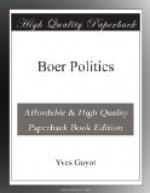“Then the cause was unexpectedly helped on by the courageous resistance of O. Bezuidenhout against the seizure of his household effects for non-payment of taxes. Here was a breach of the law easy to lay hold of; here was a crime indeed! It was illegal, undoubtedly, but illegal in the same sense as was the refusal of Hampden to pay the four or five shillings “ship money”; the taking of den Briel by the Watergeuzen (Waterbeggars) in 1572; as was the throwing overboard of a cargo of tea in Boston; as was the plot in Cape Colony against the importation of convicts. All these acts were illegal, but of such are the illegalities in which a people takes refuge, when a Government fails in its duty to a law higher than that of man.”
In virtue of the principles invoked by the Boers, the Johannesburg Uitlanders entered into a conspiracy; Jameson was to come to their aid after they had risen. Messrs. Leonard and Phillips put themselves in communication with Cecil Rhodes. He listened to their manifesto, and the instant they came to the mention of free trade in South Africa, he said: “That will do for me.” The supposition that he desired to annex the Transvaal is absurd.[1] He has admitted that he gave his personal co-operation to Jameson without having first consulted his colleagues of the Chartered Company. Jameson was to have gone to the assistance of the Uitlanders; not to forestall the insurrection, which was fixed for January 4th. On December 29th, Jameson invaded the Transvaal with 480 men. They got as far as Krugersdorp, about 31 miles distant from Johannesburg, and after a fight at Doornkop, in which the Raiders’ losses were 18 killed and 40 wounded, and on the Boers’ side four killed and five wounded, they surrendered on the condition that their lives should be spared.
That stipulation is forgotten when we fall to admiring President Krueger’s magnanimity in handing over Jameson to the British Government.
[Footnote 1: Fitzpatrick. “The Transvaal from Within.” p. 122.]
The Profits from the Jameson Raid.
The trial by the Government of Pretoria of the sixty-four members of the “Reform Committee” was held in Johannesburg. Four of them, Mr. Lionel Phillips, Colonel Rhodes, Mr. George Farrar, and Mr. Hammond were condemned to death. The remainder were sentenced to two years’ imprisonment and L2,000 fine, or failing payment, to another year’s imprisonment and three years’ banishment. The Executive reserved to themselves the right to confiscate their property.
In commutation of the four death sentences, the Government exacted L100,000; fifty-six other prisoners paid in a sum of L112,000. One of the accused died, another who had pleaded not guilty, was so ill that his sentence was not carried out; Messrs. Sampson and Davies refused to pay the fine. The British Government left Mr. Krueger a free hand in the matter; it cannot be reproached with having interposed on their behalf—although




